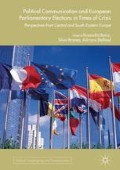Abstract
The European Parliament (EP) elections, held in Poland on 25 May 2014, were the first nationwide elections since October 2011. They also opened a new, 18-month election period, including the local government elections (November 2014), presidential election (May 2015) and parliament elections (October 2015). Therefore, the main parties in the political scene treated them very seriously, seeing them as a chance to determine their real political power. Election rivalry proceeded on two different levels. For Civic Platform [Platforma Obywatelsk: PO] and for Law and Justice [Prawo i Sprawiedliwość: PiS], winning this election was a matter of prestige. The main party of the governing coalition wanted to confirm their dominance, despite the defeat in the 2013 by-elections and falling support in the polls. For Law and Justice, after losing six elections in a row, victory in the EP elections was supposed to be the first step towards regaining power in Poland. For other Polish political parties these elections were a fight for survival. The Democratic Left Alliance [Sojusz Lewicy Demokratycznej: SLD]—entering these elections in a coalition with another left-wing party, not present in the Polish parliament, Labour United [Unia Pracy: UP], and the Polish People’s Party [Polskie Stronnictwo Ludowe: PSL], wanted to maintain their status among the parties that safely exceed the electoral threshold. However, for new political initiatives, such as the centre-left coalition Europe Plus–Your Movement (including former SLD Members of the EP, in conflict with their old party and Janusz Palikot’s party), Solidarity Poland (politicians previously connected with Law and Justice, with their leader Zbigniew Ziobro, former justice minister in Jarosław Kaczyński’s government), Poland Together, New Right and the National Movement, the EP elections were a chance to emerge onto the Polish political scene.
Access this chapter
Tax calculation will be finalised at checkout
Purchases are for personal use only
Bibliography
Antoszewski, Andrzej. “Funkcje eurowyborów.” [Features of European Elections] In Wybory do Parlamentu Europejskiego w 2004 r. na Dolnym Śląsku i Opolszczyźnie, [Elections to the European Parliament in 2004. Lower Silesia and Opole] edited by Andrzej Antoszewski, 13–35. Wrocław: Wydawnictwo Profil, 2006.
Alberski, Robert. “Wyniki wyborów do Parlamentu Europejskiego w 2009 roku na Dolnym Śląsku i Opolszczyźnie.” [The results of the elections to the European Parliament in 2009 in Lower Silesia and Opole] In Wybory do Parlamentu Europejskiego w 2009 roku w okręgu dolnośląsko-opolskim. Uwarunkowania kształtowania strategii wyborczych, [Elections to the European Parliament in 2009 in the district of Lower Silesia-Opole. Conditions of formation of election strategies] edited by Robert Alberski and Radosław Solarz, 124–149. Wrocław: Wydawnictwo Uniwersytetu Wrocławskiego, 2011.
Centrum Badania Opinii Społecznej. 10 lat członkostwa Polski w Unii Europejskiej. Komunikat z badań no 52. [Public Opinion Research Center. 10 years of Polish membership in the European Union. A research report no 52] Warszawa: CBOS, 2014.
Glajcar, Rafał. “System wyborczy do Parlamentu Europejskiego w Polsce.” [The electoral system for the European Parliament in Poland] In Wybory do Parlamentu Europejskiego w Polsce 2009, [Elections to the European Parliament in Poland 2009] edited by Rafał Glajcar and Waldemar Wojtasik, 51–73. Katowice: Wydawnictwo Remar, 2010.
Jańczuk, Lech. “Wybory do Parlamentu Europejskiego jako miernik rozwoju społeczeństwa obywatelskiego w Polsce.” [Elections to the European Parliament as a measure for the development of civil society in Poland] In Wybory do Parlamentu Europejskiego na Lubelszczyźnie w 2014 roku, [Elections to the European Parliament in Lublin region in 2014] edited by Agnieszka Łukasik-Turecka, 35–49. Lublin: Wydawnictwo Katolickiego Uniwersytetu Lubelskiego, 2015.
Merkel, Wolfgang. “Embedded and Defective Democracy.” Democratization 11, no. 5 (2004): 33–58.
Wojtasik, Waldemar. “Partie polityczne i system partyjny RP w wyborach do Parlamentu Europejskiego w 2009 roku.” [Political parties and party system of Poland in the European Parliament elections in 2009] In Wybory do Parlamentu Europejskiego w Polsce 2009, [Elections to the European Parliament in Poland 2009], edited by Rafał Glajcar and Waldemar Wojtasik, 75–95. Katowice: Wydawnictwo Remar, 2010.
Author information
Authors and Affiliations
Corresponding author
Editor information
Editors and Affiliations
Copyright information
© 2017 The Author(s)
About this chapter
Cite this chapter
Alberski, R. (2017). Results of the European Parliament Elections in Poland. In: Boicu, R., Branea, S., Stefanel, A. (eds) Political Communication and European Parliamentary Elections in Times of Crisis. Political Campaigning and Communication. Palgrave Macmillan, London. https://doi.org/10.1057/978-1-137-58591-2_16
Download citation
DOI: https://doi.org/10.1057/978-1-137-58591-2_16
Published:
Publisher Name: Palgrave Macmillan, London
Print ISBN: 978-1-137-58590-5
Online ISBN: 978-1-137-58591-2
eBook Packages: Political Science and International StudiesPolitical Science and International Studies (R0)

